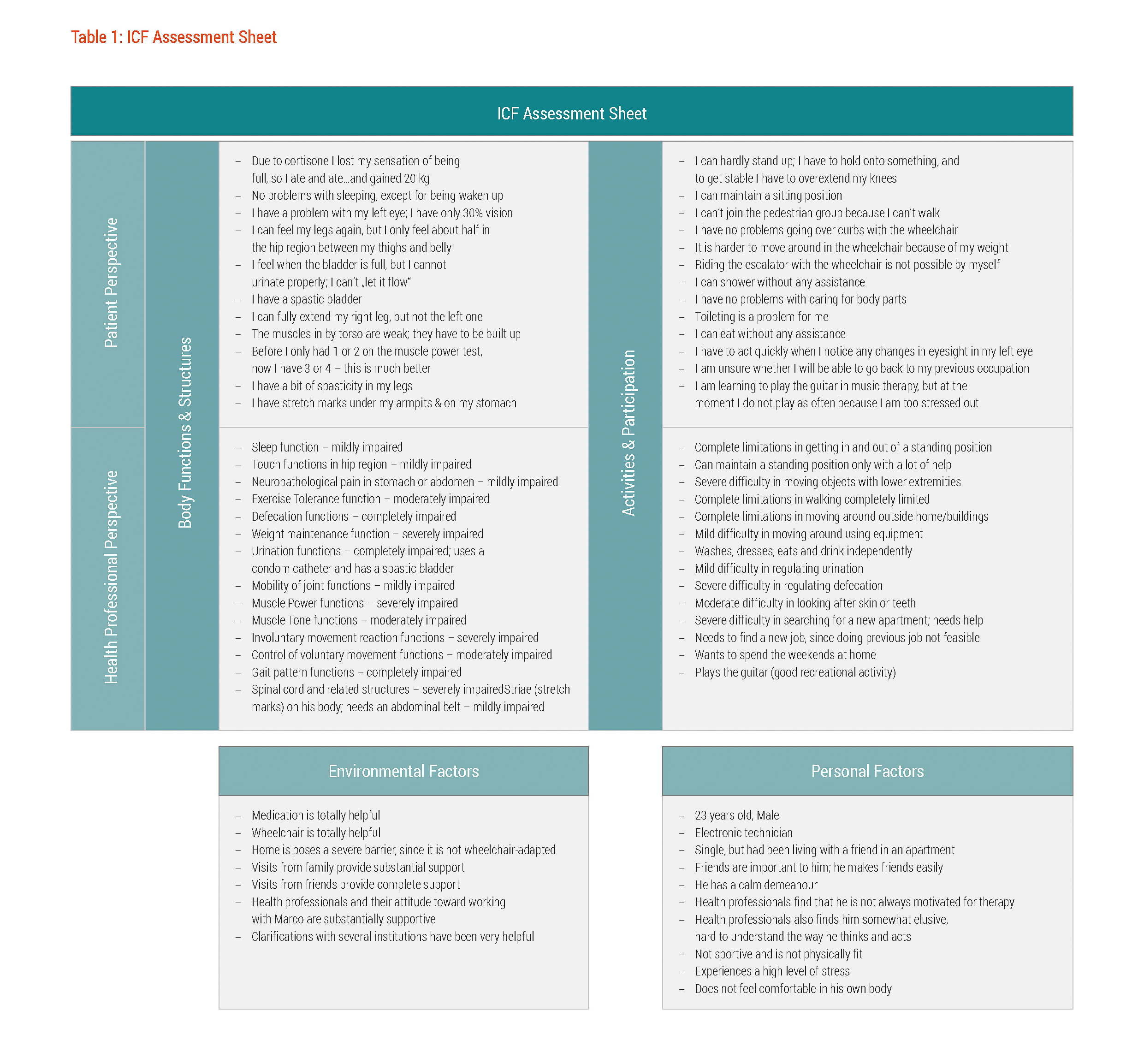Assessment
The ICF Assessment Sheet is one of several documentation sheets that were used to facilitate the rehabilitation process called the Rehab-Cycle®. Marco's ICF Assessment Sheet provided an overview of his functioning state by presenting the assessment results according to the components of the International Classification of Functioning, Disability and Health (ICF)14 – body functions and structures, activities and participation, environmental and personal factors. See the ICF Assessment Sheet in table 1.

Table 1: ICF Assessment Sheet
With regard to body functions, the rehabilitation team documented that Marco’s defecation and urination functions were completely impaired. He was unable to control urination; Marco stated that he was able to sense when his bladder was full, but he was unable to urinate. Marco was unable to sense when his bowel was full and was unable to control defecation. The physician on his rehabilitation team diagnosed Marco with a spastic bowel.
In addition to the bowel and bladder dysfunction, Marco also experienced moderate impairment in muscle tone, with spasticity in his legs, and moderate impairment in exercise tolerance functions. His muscle power functions were severely impaired, with complete impairment in the lower extremity and moderate impairment in the trunk. Joint mobility was mildly impairment. From admission to the rehabilitation centre up to the assessment, Marco had made gains in motor and sensory functioning. Consequently, Marco’s American Spinal Injury Association (ASIA) score improved from grade A to grade C, meaning that more than half of the key muscles below his spinal cord lesion were able to undergo active movement and had full range of motion in the absence of gravity.
Marco had gained a lot of weight. Since beginning steroid treatment, he had felt the urge to eat more; consequently he rapidly gained 20 kilograms.
The status of Marco's body functions impacted his ability to execute daily activities, specifically those related to mobility and self-care. For example, while Marco required minimal assistance in transferring from wheelchair to toilet or bathtub, getting in and out of a standing position and walking were completely limited. Marco was independent in showering, dressing and caring for body parts. However, he had moderate difficulty taking care of skin and teeth as well as looking after his health.
""The main limitations observed in self-care was related to toileting...""
The main limitations observed in self-care was related to toileting – for bladder management Marco was still dependent on the condom catheter. However, he required only minimal assistance in using the toilet. With regard to bowel management, Marco defecated regularly every other day. However, he needed partial assistance in manually evacuating stool.
Regarding participation in social life, Marco easily made new acquaintances in the rehabilitation centre. He learned to play the guitar in music therapy, which he visited with another rehabilitation patient. He also played the guitar when spending time with his friends. Playing the guitar served many purposes – it was a great way for Marco to relax and it helped him to better deal with worries.
Marco's did have difficulty dealing with stress and with his feelings related to his health condition. His experience of stress – one of his personal factors – was related not only to the impairments of his body functions and his undefined prognosis, but also to his precarious vocational future.
Stress is really a problem for me…also because I don’t know where I will work. And this all has to do with the uncertainties of my health condition. None of the rehabilitation staff, even the doctors, can tell me whether I will always be in a wheelchair. I have a feeling no one knows what to do, so they tell me just to be patient and wait. It’s extremely frustrating.
Marco, at time of assessment
The comprehensive assessment also looked at the environmental factors that had an impact on Marco's functioning. Facilitating environmental factors included Marco's large circle of friends and a supportive family. The environmental factor that posed a major barrier, specifically to Marco's community integration after rehabilitation, was his wheelchair inaccessible apartment.
In contrast to the uncertainties experienced at admission, the rehabilitation team was more optimistic about Marco's prognosis based on the results of the comprehensive assessment of his functioning. The assessment results offered Marco and the rehabilitation team a foundation for setting rehabilitation goals and determining intervention targets.